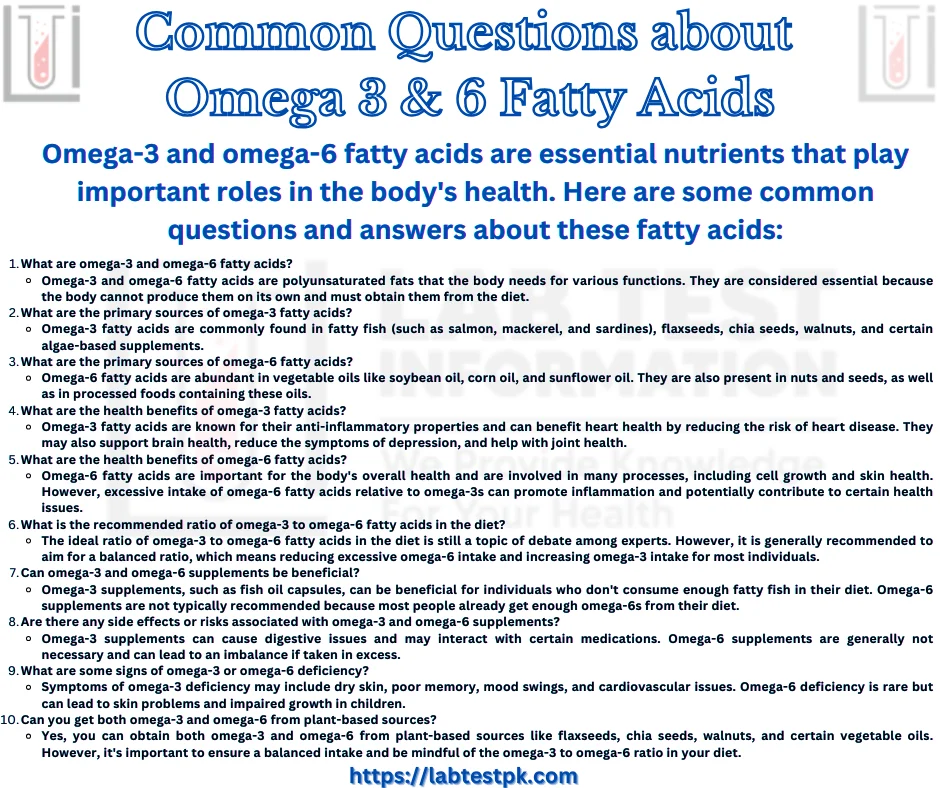Omega 3 & 6 Fatty Acids
Omega 3 & 6 Fatty Acids are essential polyunsaturated fats that play crucial roles in maintaining overall health. They are termed “essential” because the human body cannot produce them on its own, so they must be obtained through diet or supplements.
- Omega-3 Fatty Acids:
- Types: There are three primary types of omega-3 fatty acids:
- Alpha-linolenic acid (ALA): Found in plant sources like flaxseeds, chia seeds, and walnuts.
- Eicosapentaenoic acid (EPA): Mainly found in fatty fish like salmon, mackerel, and sardines.
- Docosahexaenoic acid (DHA): Also found in fatty fish and is particularly important for brain and eye health.
- Health Benefits: Omega-3 fatty acids are associated with several health benefits, including:
- Heart Health: They can help lower triglycerides, reduce blood pressure, and decrease the risk of heart disease.
- Brain Health: DHA, in particular, is essential for brain development and cognitive function.
- Inflammation: Omega-3s have anti-inflammatory properties and can help with conditions like rheumatoid arthritis.
- Eye Health: DHA plays a role in maintaining good vision.
- Sources: Fatty fish, fish oil supplements, flaxseeds, chia seeds, walnuts, and some algae-based supplements.
- Types: There are three primary types of omega-3 fatty acids:
- Omega-6 Fatty Acids:
- Types: The primary omega-6 fatty acid is linoleic acid (LA), which is commonly found in vegetable oils such as soybean oil, corn oil, and safflower oil.
- Health Implications: While omega-6 fatty acids are essential for the body, they need to be balanced with omega-3s. An excessive intake of omega-6s relative to omega-3s can contribute to inflammation and certain chronic diseases. The ideal ratio of omega-6 to omega-3 intake is a subject of debate but is generally recommended to be closer to a 1:1 or 2:1 ratio, whereas the typical Western diet may have a much higher ratio due to the prevalence of processed foods rich in omega-6 oils.
- Sources: Vegetable oils (e.g., soybean oil, corn oil), nuts, and seeds.
Can Omega-6 be beneficial?
Omega-6 fatty acids are essential fatty acids that the body needs for various functions, and they can be beneficial when consumed in the right balance with omega-3 fatty acids. Both omega-6 and omega-3 fatty acids are polyunsaturated fats, and they play important roles in maintaining overall health.
Here are some potential benefits of omega-6 fatty acids when consumed in moderation and as part of a balanced diet:
- Cell Structure: Omega-6 fatty acids are essential components of cell membranes and are crucial for maintaining the structural integrity of cells.
- Inflammation: Omega-6 fatty acids are involved in the inflammatory response in the body. While excessive inflammation can be harmful, a controlled and appropriate inflammatory response is necessary for healing and defense against infections.
- Brain Function: Omega-6 fatty acids, particularly one called arachidonic acid (AA), are important for brain function and development.
- Skin Health: Linoleic acid, a type of omega-6 fatty acid, is essential for maintaining healthy skin and hair.
- Hormone Production: Omega-6 fatty acids are precursors to certain hormones, including prostaglandins, which play roles in various physiological processes.
However, the key to reaping the benefits of omega-6 fatty acids lies in maintaining a proper balance between omega-6 and omega-3 intake. The modern Western diet tends to be disproportionately high in omega-6 fatty acids due to the widespread use of vegetable oils rich in linoleic acid. An excessive intake of omega-6 fatty acids without a corresponding intake of omega-3s can lead to an imbalance, potentially promoting inflammation and various health issues.
To promote health, it is generally recommended to:
- Consume a balanced diet: Aim to maintain a proper ratio of omega-6 to omega-3 fatty acids in your diet. Most health experts recommend a ratio of around 4:1 or lower (omega-6 to omega-3).
- Choose healthier sources: Opt for sources of omega-6 fatty acids that are less processed and lower in linoleic acid. For example, use oils like olive oil or avocado oil, which have a better omega-6 to omega-3 ratio, instead of oils like corn or soybean oil.
- Include omega-3-rich foods: Incorporate foods rich in omega-3 fatty acids, such as fatty fish (e.g., salmon, mackerel, sardines), flaxseeds, chia seeds, and walnuts, into your diet to help balance your fatty acid intake.
What foods contain omega-3 and omega-6 fats?
Here are some common food sources of omega-3 and omega-6 fats:
Foods rich in Omega-3 Fats:
- Fatty Fish: Fatty fish are among the best sources of omega-3 fats. Examples include salmon, mackerel, sardines, trout, and herring.
- Flaxseeds: Ground flaxseeds and flaxseed oil are excellent sources of alpha-linolenic acid (ALA), a type of omega-3 fatty acid.
- Chia Seeds: Chia seeds are also high in ALA and can be added to various dishes and beverages.
- Walnuts: Walnuts contain ALA and are a good plant-based source of omega-3 fats.
- Hemp Seeds: Hemp seeds provide a balance of omega-3 and omega-6 fatty acids.
- Algal Oil: Algal oil supplements are derived from algae and are an excellent source of omega-3 fats, particularly for vegetarians and vegans.
Foods rich in Omega-6 Fats:
- Vegetable Oils: Common cooking oils like soybean oil, corn oil, sunflower oil, and safflower oil are high in omega-6 fats.
- Nuts and Seeds: Many nuts and seeds, including almonds, peanuts, and pumpkin seeds, contain omega-6 fatty acids.
- Processed Foods: Many processed and fried foods, as well as fast food, are often cooked in oils rich in omega-6 fats, contributing to excessive intake.
- Meat and Poultry: Animal products, such as chicken, pork, and beef, contain omega-6 fats, primarily if the animals were fed grains rich in these fatty acids.
- Dairy Products: Dairy products can also contain omega-6 fats, especially if the animals were fed a diet high in grains.
Should you take an omega-3-6 supplement?
Here are some factors to consider:
- Dietary Intake: Evaluate your current diet to determine if you are getting enough omega-3 and omega-6 fatty acids from natural food sources. Fatty fish (such as salmon and mackerel), flaxseeds, chia seeds, walnuts, and hemp seeds are good sources of omega-3s. Omega-6s are found in vegetable oils (like corn, soybean, and sunflower oil) and nuts and seeds. If your diet is lacking in these foods, supplementation might be considered.
- Balance: The ratio of omega-3 to omega-6 fatty acids in your diet is important. In many Western diets, there is an overabundance of omega-6 fatty acids relative to omega-3s, which can promote inflammation. Striving for a more balanced intake is key. For some individuals, reducing omega-6 intake and increasing omega-3 intake through supplements may be beneficial.
- Health Goals: Omega-3s, particularly EPA (eicosapentaenoic acid) and DHA (docosahexaenoic acid), have been associated with various health benefits, including heart health, brain function, and reducing inflammation. If you have specific health goals or conditions related to these areas, supplementation may be appropriate.
- Health Conditions: Some medical conditions, such as high triglycerides, cardiovascular disease, and certain inflammatory conditions, may benefit from omega-3 supplementation. Consult with a healthcare professional to determine if supplementation is appropriate for your specific condition.
- Dietary Restrictions: If you have dietary restrictions or preferences that limit your intake of omega-3-rich foods (e.g., vegetarian or vegan diets), supplementation with algae-based omega-3 supplements (which provide EPA and DHA) can be a suitable option.
- Dosage: The appropriate dosage of omega-3 and omega-6 supplements can vary depending on individual needs. Consult with a healthcare provider or a registered dietitian who can assess your dietary habits and recommend the right dosage for you.
In summary, there is no one-size-fits-all answer to whether you should take an omega-3-6 supplement. It’s important to assess your dietary habits, health goals, and individual health conditions to determine if supplementation is necessary.



[…] Adiponectin promotes the breakdown of fatty acids (lipolysis) and reduces the release of free fatty acids into the bloodstream. Elevated free fatty acids can interfere with insulin signaling and lead to […]
[…] and Relaxation Techniques: Some therapists incorporate biofeedback or relaxation training to help individuals control their physical responses to anxiety, […]
[…] essential to remember that homocysteine levels are just one of many risk factors for cardiovascular disease, and they are often considered in conjunction with other factors such as cholesterol levels, blood […]
[…] acid is a branched-chain fatty acid that belongs to the group of phytol-derived phytopolyols. It is primarily found in certain foods, […]
[…] like C-reactive protein (CRP) and erythrocyte sedimentation rate (ESR) can indicate the presence of inflammation in your body, which may be associated with various medical […]
[…] Contact: TB is more likely to spread in close or prolonged contact situations, such as within households, healthcare settings, or […]